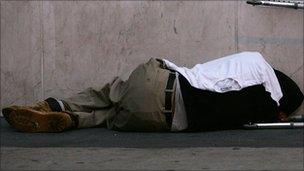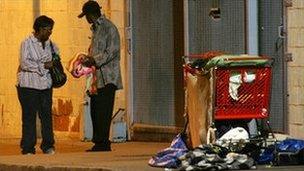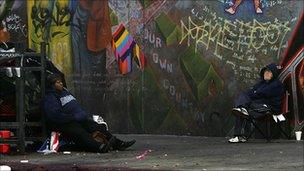Veterans battle homelessness as they return from war
- Published

Approximately one in five homeless adults in the US is a veteran
As families around the United States celebrate the nation's Independence Day, many will be counting the days to the return of their loved ones from military service in Afghanistan.
Some 33,000 troops are expected to head home by September 2012.
For those who leave the military world, there will be challenges ahead as they adjust to civilian life. The least fortunate may end up becoming homeless and many will battle the mental scars of war.
Veterans from Iraq and Afghanistan are finding themselves living on the streets faster than those who served in previous conflicts, including Vietnam.
Approximately one in five homeless adults around the US is a veteran.
Nationwide, about 130,000 ex-servicemen and women do not have anywhere to live. Los Angeles is regarded as the country's homeless capital, where the Department of Veterans Affairs, external estimates there are up to 8,000 veterans without a home.
Other organisations, including non-profit groups assisting the homeless, believe the figure is much higher.
Cardboard city
Beneath the skyscrapers and flashy buildings of downtown Los Angeles lies Skid Row. Much more than a row, the 50-block enclave is where LA's homeless gather, sleep and search for food.
It is a far cry from the Los Angeles known around the world for its beaches and Hollywood glamour.
Cardboard boxes and tents line the streets during the night, although the police force people to move on as the sun rises.
By day, with the constant blare of police and ambulance sirens, the homeless shuffle around the streets pushing supermarket trolleys packed with blankets and plastic bags.
There are missions and charity groups proving food, showers and medical facilities, although some veterans are reluctant to take advantage of the facilities.
Rob Campbell is one of them. He says he once operated top secret computer systems for the US military. He now camps down for the night in a doorway, his hair matted, his fingernails grimy, alert for trouble.
"You're down here because you're either a drug addict, you're incompetent, you've lost your job or you had some legal issues," says Mr Campbell, who served for two years in the US Air Force.
Drugged and 'dishonourable'
The throngs of homeless people roaming the streets include many veterans proudly wearing their military caps and medals. With distant expressions, many appear to be lost and confused.
The outward signs of trauma and mental illness are etched into their faces.

Los Angeles, known as the homeless capital of the country has at least 8,000 homeless veterans
"It's shameful," says Melissa Tyner, an attorney with the Inner City Law Center, external, which provides free legal representation to homeless veterans in need of help.
"Veterans coming back with post-traumatic stress disorder (PTSD) are one of the reasons why we see a huge number of veterans who are homeless," explains Ms Tyner.
"They might be self-medicating with drugs or alcohol, [and] it creates barriers for them going into shelters, they might have a fear of crowds and a resistance to authority."
Drug use while serving in the military leads to servicemen and women receiving a dishonourable discharge, a status that cuts them off from benefits once they are back home.
"They don't have access to crucial services that they need like assistance with housing, medical treatment and mental health counselling," says Elly Kugler, another lawyer at the Inner City Law Center.
"They were in the most intense combat regions. They were gunners, they were riflemen in Iraq and Afghanistan - they saw friends die, they often times were decorated, they had medals, they had ribbons and all of a sudden they started doing drugs during their military services," explains Ms Kugler.
"Despite their previously excellent record of service, they are discharged with that lower level of discharge and then they don't qualify for any services.
"They're going through physical and mental trauma and then they're just booted out to the street," she says.
'Getting worse'
With the prospect of troops returning to the US in huge numbers there are fears that, far from being eliminated, the homeless veteran problem will deepen.
"It's seriously going to get worse," says Nick Nickelson from the Kenny Nickelson Memorial Foundation, external, a group which provides food and medical support for homeless veterans.
"When the Vietnam veterans came back it became a very critical situation," he says.
"I don't know what can be done - I don't think we have a president that really cares."
Barack Obama has pledged to end homelessness amongst veterans by 2015. The Veterans Affairs Department has made the issue a priority with additional funds for mental health facilities.

The VA say they have the resources they need to address the issue of homeless veterans
"We're going to do everything we can to make it happen," says William Daniels, Chief of Mental Health for the Department of Veterans Affairs in the Greater Los Angeles Healthcare system.
"We have programmes here for these veterans coming back and as they get screened we look at their housing issues and their social issues."
"As long as we have one homeless veteran that's one veteran too many," he added.
"Our effort for homelessness is like D-Day."
"The resources are there, there's a massive effort to make it happen, there's the commitment of everyone up and down throughout the VA and the community to make this happen," said Mr Daniels.
For Rob Campbell, the process of rebuilding his life is painfully slow. He feels like his world is spiralling downwards. How can a scruffy homeless guy present himself and be taken seriously at a job interview with a computer company, he asks.
"You simply have to tell yourself that no matter how bad things are and how bad you feel and how bad you look, it's temporary and you just have to work your self out [of] it," says Mr Campbell.
"I'll find a place to clean up one of these days," he laughs.
Down and Out In the City of Angeles was broadcast at 1000 GMT on BBC Radio 4 in the UK. You can listen to the whole programme by the visiting the Radio 4 website.
- Published12 November 2010